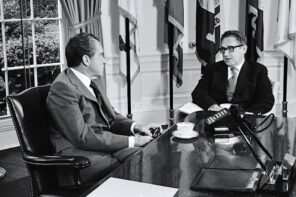Rumors that it would focus on a Bosnian Muslim woman who falls in love with her Serb captor earned Angelina Jolie’s first effort as a filmmaker, In The Land of Blood and Honey, some early controversy—and understandably so. Imagine a movie about a Jewish woman held in a concentration camp who subsequently develops feelings for her Nazi warden, who reciprocates, and is thus conflicted about his place in the war. It isn’t impossible, just improbable.
Thankfully not the crude romance it was rumored to be, Blood and Honey actually strives to be true to its people and places. Jolie used regional actors, and the dialogue is in Bosnian. Hungary, where the film was shot, is a near approximation of Bosnia, though it subtly lacks in local color and feel (too much Austro-Hungarian and not enough Ottoman). But it is the intention here that matters, and such quibbles are minor.
The bigger problem is that Blood and Honey seems to be several movies, few of which fit together, or even know what to do with each other—kind of like its two main characters, whose story is introduced too early, whose romance isn’t believable, and whose conclusion leaves us unsure what the point of it all was. Both the war, and the movie. Considering her humanitarian work, it shouldn’t be much of a surprise that Angelina Jolie’s shift from acting to filmmaking took her to the Bosnian genocide—and I’m glad she went there. I’m just not so impressed with the result.
Bosnian and the Beast
Early on, we’re introduced to Ajla, a Muslim painter who goes out dancing with a nice man named Danijel, about whom we know nothing. After the war starts, Ajla’s apartment complex is raided, the men are summarily shot, and the women are bused to a camp to “service” rowdy Serb soldiers. There Ajla, separated from her family, finds that Prince Charming is her captor.
Danijel, we then learn, is a Serb commander whose military service, and possibly his rank, is due to his father: a gruff general overloaded with nationalist bile who has only to slap his son a few times to change his mind about virtually anything. Danijel is a contradiction; popular among his men, including rapists, drunks, and sadists who laugh hysterically when they shoot civilians, he is also a tender protector of Ajla.
How can this possibly make sense, and how can Ajla go along with this? As might be expected, there are two phases to Ajla and Danijel’s relationship. Less expected, however, is that the phases aren’t divided by the war. At first, their relationship is tender, despite the fact that Danijel is in charge of a rape camp whose victims include Ajla’s co-religionists; Danijel makes sure Ajla is off-limits to the men, invites her to his quarters frequently, and suggests ways she might escape.
In the second half, though, Danijel transforms. He berates Ajla, ties her to a bed, threatens to hit her, nearly rapes her, and otherwise harangues her. Why the transformation? (The war has been going for many months at this point.) Well, he’s become what he should be—and it’s a far more honest portrayal of the kind of man who desires (to own) a woman while actively participating in the extermination of her people. It’s a far easier portrayal to keep down than the kindhearted man trapped against his will in a war of ethnic cleansing.
Yet we’re still meant to be moved by this softhearted son of a powerful bigot, caught in a war that has overwhelmed him (and Ajla, of course). But it’s unclear why this should present any kind of moral dilemma—or, at least, one I need sympathize with. You are either committing ethnic cleansing or you are not. (I can’t believe I have to write that sentence.) If Jolie wanted to portray the Bosnian War as tragedy, Danijel is the wrong vehicle for her ambition; he is, at first, unconvincingly rendered, and finally too reprehensible to accomplish this purpose.
I mean, what does Danijel’s interior monologue even sound like?
Bad Danijel: “I must kill them all.”
Good Danijel: “But she’s beautiful and I love her.”
Bad Danijel: “But dad will be angry at me if I don’t join his genocide.”
Danijel Reunited: “Okay, genocide, you win.”
This is Danijel’s evolution over the course of the movie, and yet the kind of monstrous person who could even have this debate with himself doesn’t show up till very late in the story; it is as if Jolie could not bring herself to make Danijel the criminal he needed to be. Because, of course, that would rob of us of any desire to identify with him, let alone with Ajla and her relationship to her people.
We don’t know if Ajla’s attraction to Danijel is her following her heart, despite her fellow prisoners getting raped and otherwise sexually humiliated in front of her, or more reasonably her pretending to love him out of sheer horror at what would otherwise be her fate. That emotional uncertainty continues even as her behavior becomes more understandable, suggesting once more that the movie does a poor job of correlating emotional evolution with the pace of war.
Near the end of the war, we’re left with an Ajla who’s as much of a quandary as the conflict, which started and then gets stopped. To show us the horror of the war hurts and stabs and lingers, but that merely leaves us somewhere between documentary and drama, and not in a good way.
The Bigger Picture
Sarajevo underwent the longest siege in the history of modern war, and Jolie has certainly evoked the grimness of those years. But these scenes are overwhelmed by strange spells of listlessness. We seem to be waiting for something to happen, but we’re never sure what, and then the war ends. At times the actors also convey a languorousness all out of proportion to the war around them.
Oddly, we’re also thrown into the brutal Bosnian conflict without any attempt to explain why it began, except to intermittently hint that the country was tolerant before the fall of Communism, and then it wasn’t (except, of course, dictatorships are by definition intolerant). For a movie that revolves around conflicting identities, it’s a little hard to believe that these religious markers had been entirely meaningless—“we were all Bosnians before the war”—and then cause for concentration camps.
We do hear Serbian propaganda, but the average viewer would have no frame of reference for it. Serbs refer to Turkish treachery in the past, for example, yet it’s not clear if anyone would know that Bosnian Muslims are not Turks—that they are ethnically and linguistically the same as Serbs. The two are, in fact, differentiated by religious affiliation, which has become not a matter of choice or conviction, but of identity, and thus political destiny.
Worse, though, is that we never hear the Bosnian Muslims’ side(s) of the story. We see their suffering, of course—the vile killings, the shocking number of rapes, some of which are so forward, so casually monstrous, thumping down on you so suddenly, that you might find yourself crushed hours later—but we never learn why the war happened, or what the Muslims make of Serbian propaganda.
Wars have causes. They are ugly, painful, and often inexcusable—but they are not incomprehensible. These omissions matter because we cannot otherwise know if the characters’ motivations are legitimate, exaggerated, or unacceptable. The uncertainty of what’s happening around and to them renders the romance frustrating and even, at times, tiresome.
I Love My Ethnic Cleanser
For anyone who didn’t know what went down in the middle of Europe fifteen years ago, this movie will hit you as an unsettling but necessary shock. Beyond that didactic value, though, there remains a flatness of feeling and an absence of emotion that may be the fault of a story that fails to compel us because we are morally uncertain if it should.
Judith Butler asks whom we can mourn, pointing out that we are less upset by violence than by who commits the violence. Glenn Greenwald asks us pointedly how to define a terrorist. Jolie, though perhaps not intentionally, makes me ask: Which inhumanities can be humanized? Are the crimes the source of our revulsion, or is it the criminals? Or is it who the crimes are inflicted on? Are some murders more murderous than others?
In that case, do we want to identify with the characters, or are we better off indifferent to them? Sometimes, when a movie leaves you without answers, it’s not because it has forced you to change your perspective on the world, but because it never knew what it wanted to do in the first place, save for making us feel in our hearts that this war was a very bad thing. Which, of course, it was—and that is why the relationship at its heart seems all the more incomprehensible.




